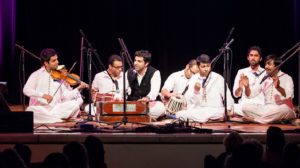 This was an unexpectedly lively concert, where clapping was an important component by the performers, but also by the audience on just about every piece. They were dressed in orange and red, and all sat cross-legged on the stage.
This was an unexpectedly lively concert, where clapping was an important component by the performers, but also by the audience on just about every piece. They were dressed in orange and red, and all sat cross-legged on the stage.
Most of the musicians were singers. Sonny, the lead, also played a harmonium, like a table-top accordion. It required regular pumping which he did with his hand. And when he forgot (frequently), his neighbor would take over. There was also a tabla drummer, and some kind of single string instrument.
But this was not the twangy discordant Arabic music that I had anticipated. The songs were melodic, and quite lovely, often with rousing choruses. They were a mix, from India, Pakistan, Afghanistan, and Persia. The songs are in a Sufi tradition, which as explained by Sonny, can be interpreted on 2 levels, as a love song about a person, or as a more mystical religious level.
Sonny is from Texas, and he joined in 2006. Sid joined in 2009. They don’t use their last names in the materials so you can’t tell their religious affiliation.
Too bad the concert was so short…
From the Hop before the concert:
It’s rare to hear live qawwali music in the Upper Valley, so I wanted to share more about this marvelous tradition and how you can best enjoy Friday’s concert.
Qawwali is the best-known form of Sufi devotional music. It originated in India and is part of a musical tradition that stretches back for more than 700 years. Originally performed at Sufi shrines or dargahs throughout South Asia, it was little known beyond South Asia until the late 20th century. Although Pakistani singers brought qawwali to the United States in the mid-1970s, it was not until the late ’80s that the music gained a truly global audience, primarily through the work of Nusrat Fateh Ali Khan.
Sung in many languages, including Urdu, Punjabi, and sometimes Persian, qawwali is totally enchanting: a lively, devotional, poetic music with fantastic, rocking rhythm that you can clap along to. Some people are roused by the ecstatic singing, and dance in the aisles—which is totally acceptable!
What makes the group Riyaaz Qawwali so special is that its members represent Muslim, Hindu, Sikh and Christian backgrounds. In fact, Riyaaz avoids listing its members’ last names, which would identify who is which religion. These musicians are drawn together by a powerful love of the incredible musical and literary legacy that is qawwali. While they retain the music’s devotional quality, they broaden its religious and cultural base by adding poetry of famous South Asian poets of multiple linguistic and religious backgrounds. You can read more about the ensemble and qawwali in our online playbill. [see below]
